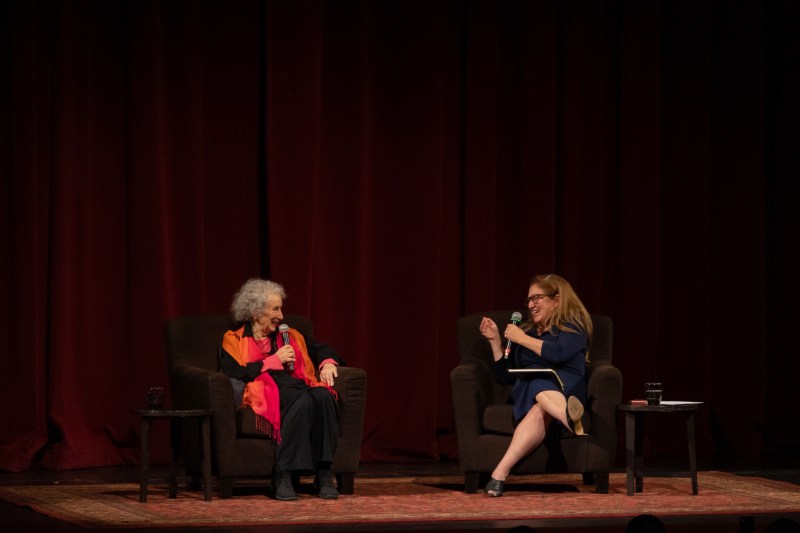Does Margaret Atwood loathe religion? The question earned a laugh from Atwood on Saturday, who jokingly denied the accusation. She responded that religion, like technology and everything human, has “a good side, a bad side and a stupid side you didn’t anticipate.”
On Saturday, Atwood, author of over 50 books, most notably “The Handmaid’s Tale” and “Cat’s Eye,” came to speak at Memorial Auditorium. Her works delve into a variety of themes such as gender, religion and the politics of power. She has been praised for her intelligent and powerful handling of such themes.
The event, hosted by Stanford Live and presented in partnership with the Stanford Storytelling Project as well as the Stanford Speakers Bureau, was moderated by Canadian writer and lawyer Dahlia Lithwick. Her most recent book, “Lady Justice: Women, the Law, and the Battle to Save America,” discusses women lawyers who fought for justice during Trump’s presidency. The introductions of both Atwood and Lithwick were kept short and sweet, hitting the right balance between informative and concise.
As Lithwick asked her preprepared questions to Atwood, audience members were handed postcards in order to write down their own questions for the author. By no fault of Lithwick’s, despite leaving time for a number of audience questions, there was nowhere near enough time for everyone to ask their questions — both Lithwick and Atwood cracked several jokes over the large stack of postcards that Lithwick was handed.
Indeed, there were several standout humorous moments from the event. Atwood has an incredible sense of dry humor and was not hesitant to include it in her answers. When asked what brought her joy, Atwood poked fun at her age and answered that she was just happy to find herself alive each morning. Lithwick similarly used humor to connect with the audience, and was not above poking fun at herself, at one point laughing at the irony of talking about “The Handmaid’s Tale” while dressed modestly.
Most of the questions asked to Atwood were related to politics in some way. Given Atwood’s timely political commentary and Lithwick’s background, this focus on politics is something that made sense. However, I couldn’t help but wish more questions had been asked about Atwood’s personal experiences as an author. I was curious to learn more about her thoughts on the power of speculative fiction or to learn about her writing process, which was unfortunately not touched upon.
While Atwood was able to give wise and well-informed answers when asked about politics, her comments did not feel any more insightful than anything I had already read in her books. For example, a question on the predictive power of her speculative fiction works prompted Atwood to respond that “countries base their new forms of government on their old forms of government.” This idea is explored in much more depth in “The Handmaid’s Tale.” In other words, I felt that many of the questions asked were phrased in ways that simply prompted Atwood to plainly state the themes of her works without exploring them in more depth. That being said, it was not only Lithwick’s questions that had this political focus, but also many of the audience’s questions, so perhaps this was a minority opinion.
At times, the questions that Lithwick asked were too verbose, leading to confusion on what was being asked. Additionally, the long setup to Lithwick’s questions led to several interruptions from Atwood. At times, it felt as though Atwood and Lithwick were commenting on tangential topics rather than directly responding to each other. Still, these conversations were interesting and meaningful.
For instance, when discussing the origins of “The Handmaid’s Tale,” Atwood mentioned that her imagined dystopian future was inspired by Reagan’s presidency. It then became timely once again during Trump’s presidency, due to the similar anxieties these two presidencies caused. Despite these similarities, Atwood discouraged the audience from viewing political movements in an endless cycle. “There is no inevitable pendulum,” said Atwood. “You can never know the future, only make your best guess.”
Speaking with some other attendees after the event, I noticed some similar complaints about the way that some of the questions were asked. That being said, everyone I spoke to mentioned that they were happy to have attended — a statement with which I agree. Though the moderation was occasionally lacking, the event still managed to be meaningful. From the humor of both Atwood and Lithwick to some of Atwood’s more thought-provoking comments, I was ultimately very glad to have gone.
Editor’s Note: This article is a review and includes subjective thoughts, opinions and critiques.
